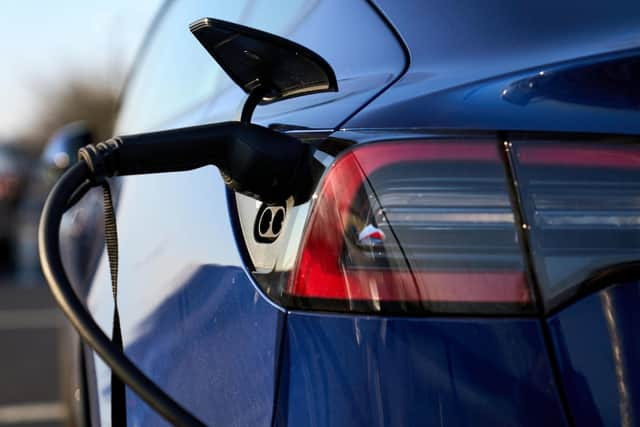Electric vehicles work but Britain is at risk of missing out - Andy Brown
All you have to do is press your foot down when you want to go and move it to the brake when you want to stop and that takes a lot of the stress out of stop start driving.
Filling up the car with power is also very easy. Instead of having to queue up at a petrol station normally I just plug it in when I get home.
That has cut my costs phenomenally.
Advertisement
Hide AdAdvertisement
Hide Ad

Even at peak times I can put 200 miles of charge into the car for well under £20 and if I tell the car to start charging at 1am in the morning that cost goes down to under £10.
The distance I can go on one charge is every bit as far as I can manage to drive without taking a break. On one trip I managed to drive three passengers and luggage for 250 miles on a single charge and still had over 10 per cent of the power left.
At first I had a significant degree of anxiety when travelling away from home about finding a suitable charger. So far that has proved to be misplaced. I’ve had both good and bad experiences, but it hasn’t taken long to figure out how to track down convenient charging points.
On one early trip I stopped at a motorway services for a coffee, plugged in, showed the charger my credit card and went off for a coffee break that I needed. When I came back the car was fully charged. Job done and no time wasted.
Advertisement
Hide AdAdvertisement
Hide AdOn another trip I stopped at a different service station that must have had a thousand or more cars parked up but couldn’t locate the charger.
When I asked I was told it was on the other side of the motorway serving traffic heading in the other direction. I thought about asking them to run a cable over the bridge and decided against it. I won’t be giving them any more custom.
Arriving at destinations where I hadn’t been before has also been a mixed experience. Visiting friends in a small village with no public charges proved easy. They simply asked around and a friendly neighbour offered the use of their charger at cost. Plus a well-deserved bottle of wine.
A trip to Monmouth proved even easier as there was a charger in the public car park next to our hotel that was quicker and more convenient than the local petrol station would have been. The only problem I have had was on a trip to Hexham when it took me a little longer to sort myself out because I misread the first charger I found and only got 50 extra miles into the battery whilst I was visiting the local supermarket. When I tracked down the rapid charger I refilled the power much more easily.
Advertisement
Hide AdAdvertisement
Hide AdSome of the myths that are going round about the problems of electric cars are simply wrong.
Driving around a tank full of petrol is a lot more dangerous than moving around an electric battery.
The spectacular fire that burned out so many cars in the multi storey car park at Luton Airport is thought by the police to have started in a diesel car that triggered explosions in nearby tanks of fuel.
The capacity of the grid to charge electric cars is also not a huge problem. From home it is very easy to draw the energy to charge a car in the middle of the night when it is cheap because little of the capacity in the system is being used.
Advertisement
Hide AdAdvertisement
Hide AdThere are, however, a few problems which are genuinely difficult to overcome. One is that it is very difficult to charge a car from a terraced house or a block of flats and that anyone depending on public charging points faces significantly higher costs. The other is that the up-front capital investment is high and it takes time for the reduced running costs to pay it back.
Not everyone has the money to spare to gain the long-term savings and not everyone does enough miles to pay back the current extra cost.
Purchase costs are, however, dropping rapidly and competition between public charging points should start to cut those costs.
It therefore seems incredibly short sighted that the government decided to delay asking for new petrol cars to be equipped with a small electric motor until 2030. That feels like an incredibly over cautious approach to new technology.
Advertisement
Hide AdAdvertisement
Hide AdElectric cars work well, are exceptionally cheap to run and pump out a lot less air pollution and carbon dioxide. British manufacturers were therefore understandably cross when their own government asked them to gear up for their wide introduction and then changed its mind.
If my experience is anything to go by then the British public will have an equal right to be annoyed if they are discouraged from making a change to a much more efficient technology.
It already works much better than the old one and they’ll be missing out.
Andy Brown is the Green Party councillor for Aire Valley in North Yorkshire.
Comment Guidelines
National World encourages reader discussion on our stories. User feedback, insights and back-and-forth exchanges add a rich layer of context to reporting. Please review our Community Guidelines before commenting.